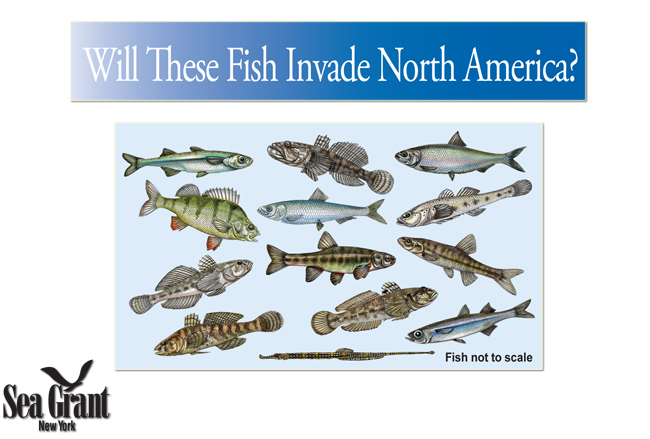Oswego, NY, June 29, 2016 - Under examination in a four-page fact sheet from New York Sea Grant (first released in March 2015) (pdf) is the question of whether a number of foreign fish species will, at some time, find their way into North American waters.
NYSG Fisheries Specialist Dave MacNeill collaborated on this outreach material with scientists at Buffalo State College, who translated Russian research on life requirements of 42 Ponto-Caspian fish and used this new information to predict the invasion (risk) potential of these fish species to North America.
Identified by the research team were 10 species with some potential to invade North America — Black Sea Kilka, Caspian Sea Sprat/Kilka, Eurasian Perch, Eurasian Minnow, Big Scale Sand Smelt (aka Black Sea Silversides), Black Sea Shad, Black Striped Pipefish, and three gobies: Monkey Goby, Volga Dwarf Goby and Caspian Big-head Goby.

Like invasive species already established in North America, many of the fish species examined in this study have invaded many parts of Europe via human activities such as canal construction, shipping, bait and the aquarium trade — often with serious impacts on native species. Species with broad salinity tolerances make them candidates for successful ballast transport to new areas.
In addition to boasting a multitude of full-color drawings of the various fish species, the fact sheet addresses one key question: What do we know about these 10 potentially invasive fish species?
More Info: New York Sea Grant
New York Sea Grant (NYSG), a cooperative program of Cornell University
and the State University of New York, is one of 33 university-based
programs under the National Sea Grant College Program (NSGCP) of the
National Oceanic and Atmospheric Administration (NOAA). The NSGCP
engages this network of the nation’s top universities in conducting
scientific research, education, training and extension projects designed
to foster science-based decisions about the use and conservation of our
aquatic resources. Through its statewide network of integrated
services, NYSG has been promoting coastal vitality, environmental
sustainability, and citizen awareness about the State’s marine and Great
Lakes resources since 1971.
New York Sea Grant maintains Great Lakes offices at SUNY Buffalo, the
Wayne County Cooperative Extension office in Newark and at SUNY Oswego.
In the State's marine waters, NYSG has offices at Stony Brook University
and Stony Brook Manhattan, in the Hudson Valley through Cooperative
Extension in Kingston and at Brooklyn College.
For updates on Sea Grant activities: www.nyseagrant.org has RSS, Facebook, Twitter, and YouTube links. NYSG also offers a free e-list sign up via www.nyseagrant.org/coastlines for its flagship publication, NY Coastlines/Currents, which is published several times a year.